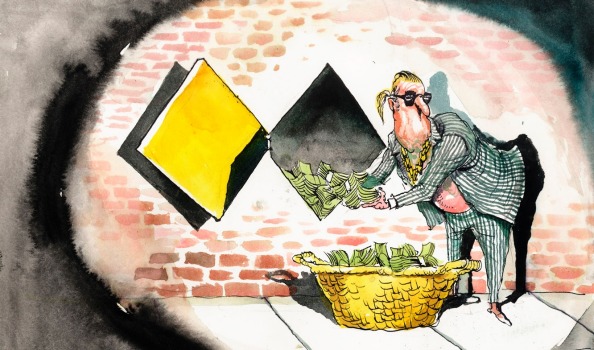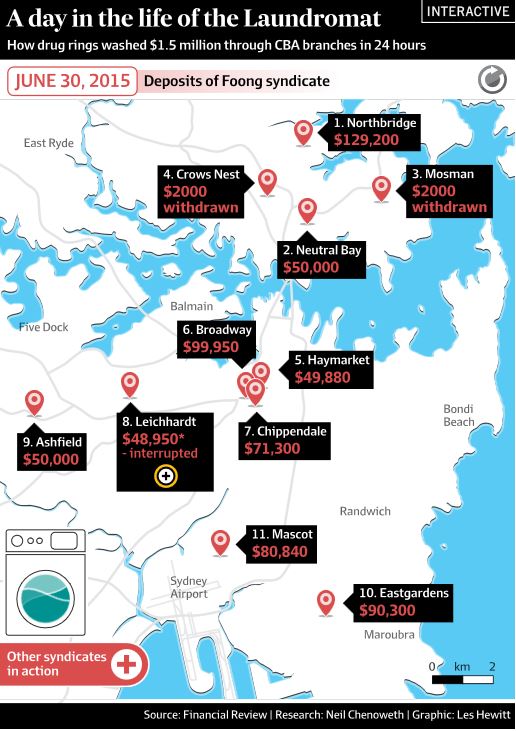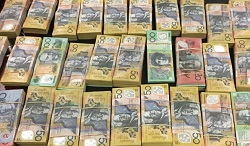When Prof Jason Sharman told Phillip Adams that half a million dollars was stuffed into the new intelligent deposit machines installed in the Commonwealth Bank from 2012, and then did the same for the next three years, it sounded incredible, and if true, could only happen with complicit corruption. Seems it didn’t happen quite like that, but what authorities say did happen is staggering and quite bizarre.
After my first post, a number of creditable pieces became available, which I’ve listed below:
- ABC RN A Banker’s guide to money laundering Phillip Adams talks to Jason Sharman, Sir Patrick Sheehy Professor of International Relations at the Department of Politics and International Studies, University of Cambridge.
- ABC RN The CBA, money laundering and who knew what Geraldine Doogue talks to James Eyers, Financial services editor, The Australian Financial Review and Nathan Lynch, Bureau Chief in financial crime and risk in the Asia Pacific for Thomson Reuters
- Joanna Mather, Patrick Durkin and Jacob Greber AFR Directors must ask if they would pass ‘the front page test’
- Ronald Mizen AFR AUSTRAC case casts shadow over $50, $100 banknotes
- James Frost and James Thopson AFR CBA chief executive Ian Narev to retire by June 2018
- James Frost AFR CBA executives face more pay pain
- Duncan Hughes AFR Property is AUSTRAC’s money-laundering blindspot
The AFR links are likely paywalled.
The juicy bit comes from the Chenoweth story of Fung and Foong.
A Chinese man Yuen Hong Fung succeeded in stuffing over $650,000 into the IDMs in just one day in 2015, that’s 13,000 $50 notes. We know this because Fung and a Malaysian man Kha Weng Foong were arrested four days later at East Gardens where they had just deposited $49,700. That was on top of $414,400 they had already deposited that day at five other branches. Police found $200,000 in cash in Foong’s car, along with 16 fake driving licences.
Fung had another $520,000 in his home, being the next day’s work.
Despite being arrested $404,450 had been transferred to Hong Kong already that day.
It seems these guys knew about the $10,000 AUSTRAC reporting limit and were depositing $9,950 in various accounts and identities until the machine was full, then they’d move to the next one. The limit for overseas transfer was $50,000, so that part was less demanding.
Foong it seems had been a specialist in forged identities, who then moved into money laundering for drugs, while retaining his skill set.
Fung was kicked out of Australia as a student for fraud, but managed to come back 37 times. When caught he had 29 identities.
Here’s David Rowe’s version of what happened:

Except the stuffers no doubt looked ordinary rather than sinister.
Here’s what we are told Fung achieved on June 30, 2015:

It’s not clear that any of this was reportable to AUSTRAC, in fact it seems it wasn’t. However, the activity was noticed by at least one branch. Apparently alarms go off when someone is stuffing too long, or the machine was full. On one occasion at least a local manager sort of shooed the stuffer away and then sent an email to CBA HQ suggesting urgent action. The stuffer simply packed up and headed for the next branch.
In May 2015, the local manager of the Leichhardt Branch was alerted by the alarm when the terminal was full, so he investigated what was happening by examining the accounts. Amounts of less than $10,000 had repeatedly been deposited into two accounts, which were then pinged overseas in amounts of less than $50,000. He duly reported what had happened to the CBA security unit.
Then in June the same sort of thing happened 12 times. On 30 June the alarm went off when the terminal was full. The manager went and asked if he could help, and the man said he was “fine” before disappearing.
The manager then sent an urgent email to CBA security, including in part:
- “The person who is making the deposit would clearly know the process as sometimes they deposit into all different accounts until the ATM is full then leave.
“Today at about 1:05 the ATM alarm triggered. I approached the client to see if he needed any assistance. He said he was fine.
“I believe that there should be another security measure in place as this is crazy. If you review these peoples accounts they have sent millions and millions overseas!! I am emailing to find out what we should do.”
That’s when the police asked the CBA to block 19 different accounts, and four days later arrested the clients.
We are told that the CBA security unit recruits their staff mainly from AUSTRAC. So did this unit call the police, or was it the other way around? Does AUSTRAC only get information about crooks too stupid to stay within the rules? What do they do with information they get?
Various wise people have said the bank needs to get to know its customers. Presumably if they steal identities, they are also accomplished conmen. Does it follow them home, or hire a private eye to do it for them?
Personally I can’t imagine that any legitimate business should generate so much cash, so should the bank simply close the accounts?
At what point did the CEO have enough concrete evidence that he should have informed the market?
Joanne Gray in the AFR linked in the earlier post says:
- AUSTRAC alleges that $8.91 billion was deposited in CBA’s Intelligent Deposit Machines before CBA conducted any risk assessment for money laundering and financing terrorism. It also alleges that CBA repeatedly failed to report transactions to the agency as required by legislation, and that it “adopted a policy not to report” if similar transactions had been reported within three months.
That sounds serious. Surely someone should be locked up. Yet Anne Hyland says:
- Lawyers have estimated that if the AUSTRAC civil case against CBA is successful a fine could be as much as $500 million. Although CBA has argued it should be closer to $18 million. What CBA spends to defend itself could also run into the millions.
Sharman said that there is hardly a bank in the world outside Australia which hasn’t gotten into trouble over money laundering, and some of the penalties have run into billions. Yet penalties paid by ‘the bank’ will mainly hurt the 800,000 investors and super funds, who were guilty of nothing, and are supposed to be protected in ‘limited liability’ system.
I would rather the senior officers within the bank be punished if there were sins of commission or omission. The second Frost article reports:
- Alden Toevs was the bank’s chief risk officer from 2008 to 2016. Mr Toevs retired on June 30, 2016 meaning he was not caught by the chair’s decision to reduce cash bonuses to zero. In 2016 he was paid $4.6 million, which included a $752,091 cash bonus and an identical payment that was deferred for 12 months.
He’s still doing consultancy work with the bank and has millions of dollars of share options available, which the bank under Livingstone is now considering.
- David Craig was the bank’s chief financial officer from 2006 to 2017. Mr Craig was the second highest paid executive at the bank in 2016 receiving $4.6 million, which included a $812,044 cash bonus and an identical payment that was deferred for 12 months to June 30, 2017.
He’s also got millions of dollars of share options.
While the AUSTRAC action brought things to a head, a civil case against the bank in an adversarial judicial setting might not do much other than line lawyers pockets.
ASIC is initiating an investigation, which may penetrate the murky mid-levels of the bank, or not. I have some faith long-term in action being taken by board chair Catherine Livingstone, who has announced that Narev will go at the end of the financial year. Other than that a Royal Commission would be slow, but could turn the whole sorry business inside out.
There are ongoing problems with banknotes and the cash economy generally. For crooks the $50 note is the medium of choice, and $100 notes are perhaps not used much outside tax avoiders and crooks. Limiting us to $20 would at least slow things down, but the internet has only just past the 50% mark of all transactions, so we may not yet be culturally ready for the cashless society.
One wonders what the other big banks have done to stay clean, as far as we know. CBA was probably the bank of choice, as crooks exploited its weakness, but cleaning up its act will not stop the crooked cash generating businesses.
Finally, it seems some of the bad money may be coming home via real estate. Westpac are now insisting that foreigners buying houses in Australia have a tax file number. But Duncan Hughes, linked above, says:
- Under existing law, real estate agents and other businesses involved in buying and selling real estate do not need to identify where the money comes from or who is paying.
The beneficial owner of a property does not have to reveal their identity.
- Asians were last year the biggest investors in Australia, spending about $47 billion largely on residential and commercial property, according to the Foreign Investment Review Board.
An estimated 70 per cent of Chinese buyers pay in cash, according to Transparency International, an international non-government organisation targeting corruption.
Apparently Attorney-General George Brandis is going to announce new powers and resources for AUSTRAC, but is not extending their reach to real estate. Yet:
- “I believe the case for reform is compelling,” said Malcolm Shackell, a forensic crime specialist and partner with global consultancy PwC. “Australia is under pressure from international agencies to broaden the scope of its regulations to cover industries outside of financial services, including real estate agents, jewellers, accountants and, potentially, conveyancing lawyers.”
Identities, we are told, can be purchased on the “Dark Web”, which is like eBay to criminals.
In fact identity fraud and cyber crime is “systemically undermining” the nation’s financial system according to The Black Economy Taskforce due to report soon.
- Banks and the private sector must unite with federal and state agencies to develop an incorruptible, biometric barrier – using retina scans, facial recognition and electronic finger print recognition – against sophisticated cyber-crooks exploiting gaping holes in the nation’s financial, welfare and security systems, the powerful taskforce is expected to tell the federal government.
But will they listen? It seems more regulation is balanced against ‘the cost of doing business’.


Some are saying the Ian Narev, who is to retire around mid-2018, is the first casualty. So the poor bloke will have to live on the $50 million plus he’s made while he is there.
In one sense I can feel sorry for him. These jobs are a tough gig, and usually after their stint ex-CEOs like him go on to chair boards of other companies, or positions of public trust, like the Future Fund. Who will want Ian Narev?
On a human level, seems he’s been through a bit:
Ah yes: “DRUG SYNDICATES TURNED CBA INTO A MONEY PUMP, BUT THE WHOLE FINANCIAL SYSTEM IS AT RISK”
It is just another example of the damage that our punitive approach to drug control does. Punitive drug laws=Lots of money that needs laundering=incentive for banks to ignore activities that boost their profits and the the final outcome is corrupted systems, violent crimes, swollen jails and….
Ask yourself what would happen if the drug money disappeared because someone other than Richard DiNatale actually went and looked at what effect the changes being made in P{Portugal were actually having.
Removing a bonus system that actually rewards questionable behaviour might help too.
John, thanks for that. It has inspired me to look up the post I did in June 2015 Portugal decriminalised drugs, from cannabis to crack.
That post still gets a trickle of visitors through internet searches. It’s more than a little sad if no-one from other parties has bothered to go and see what a civilised approach to the drug issue might look like.
Totally agreed John, and Brian that was a good post.
Although this time I doubt it was all just drug money.
Illicit anything money needs the same laundering, from tobacco, firearms, gambling, prostitution….
Creates a lot of jobs on both sides of the equation though
Jumpy: Crime seems to thrive on things that the customers want rather than things like direct stealing.